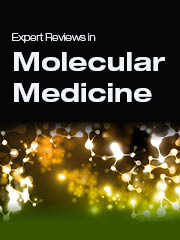Crossref Citations
This article has been cited by the following publications. This list is generated based on data provided by
Crossref.
Orojan, Ivan
Szigeti, Csaba
Varszegi, Szilvia
Dobo, Endre
and
Gulya, Karoly
2006.
Dithranol abolishes UCH-L1 immunoreactivity in the nerve fibers of the rat orofacial skin.
Brain Research,
Vol. 1121,
Issue. 1,
p.
216.
Lindner, Holger A.
2007.
Deubiquitination in virus infection.
Virology,
Vol. 362,
Issue. 2,
p.
245.
Clay, Candice C.
Rodrigues, Denise S.
Ho, Yan S.
Fallert, Beth A.
Janatpour, Kim
Reinhart, Todd A.
and
Esser, Ursula
2007.
Neuroinvasion of Fluorescein-Positive Monocytes in Acute Simian Immunodeficiency Virus Infection.
Journal of Virology,
Vol. 81,
Issue. 21,
p.
12040.
Layfield, Robert
2007.
The molecular pathogenesis of Paget disease of bone.
Expert Reviews in Molecular Medicine,
Vol. 9,
Issue. 27,
p.
1.
Grant, M M
Scheel-Toellner, D
and
Griffiths, H R
2007.
Contributions to our understanding of T cell physiology through unveiling the T cell proteome.
Clinical and Experimental Immunology,
Vol. 149,
Issue. 1,
p.
9.
Komander, David
and
Barford, David
2008.
Structure of the A20 OTU domain and mechanistic insights into deubiquitination.
Biochemical Journal,
Vol. 409,
Issue. 1,
p.
77.
Folmer, Florence
Jaspars, Marcel
Dicato, Mario
and
Diederich, Marc
2008.
Marine natural products as targeted modulators of the transcription factor NF-κB.
Biochemical Pharmacology,
Vol. 75,
Issue. 3,
p.
603.
Enesa, Karine
Zakkar, Mustafa
Chaudhury, Hera
Luong, Le A.
Rawlinson, Lesley
Mason, Justin C.
Haskard, Dorian O.
Dean, Jonathan L.E.
and
Evans, Paul C.
2008.
NF-κB Suppression by the Deubiquitinating Enzyme Cezanne.
Journal of Biological Chemistry,
Vol. 283,
Issue. 11,
p.
7036.
Byekova, Yevgeniya A.
Powell, Rhonda R.
Welter, Brenda H.
and
Temesvari, Lesly A.
2010.
Localization of Phosphatidylinositol (3,4,5)-Trisphosphate to Phagosomes in
Entamoeba histolytica
Achieved Using Glutathione
S
-Transferase- and Green Fluorescent Protein-Tagged Lipid Biosensors
.
Infection and Immunity,
Vol. 78,
Issue. 1,
p.
125.
Almeida, Stéphanie
Ryser, Stephan
Obarzanek-Fojt, Magdalena
Hohl, Daniel
and
Huber, Marcel
2011.
The TRAF-Interacting Protein (TRIP) Is a Regulator of Keratinocyte Proliferation.
Journal of Investigative Dermatology,
Vol. 131,
Issue. 2,
p.
349.
Suzuki, Shunya
Tamai, Keiichi
Watanabe, Masahiko
Kyuuma, Masanao
Ono, Masao
Sugamura, Kazuo
and
Tanaka, Nobuyuki
2011.
AMSH is required to degrade ubiquitinated proteins in the central nervous system.
Biochemical and Biophysical Research Communications,
Vol. 408,
Issue. 4,
p.
582.
Burkholder, Kristin M.
Perry, Jeffrey W.
Wobus, Christiane E.
Donato, Nicholas J.
Showalter, Hollis D.
Kapuria, Vaibhav
O'Riordan, Mary X. D.
and
McCormick, B. A.
2011.
A Small Molecule Deubiquitinase Inhibitor Increases Localization of Inducible Nitric Oxide Synthase to the Macrophage Phagosome and Enhances Bacterial Killing.
Infection and Immunity,
Vol. 79,
Issue. 12,
p.
4850.
Jura, Jolanta
Skalniak, Lukasz
and
Koj, Aleksander
2012.
Monocyte chemotactic protein-1-induced protein-1 (MCPIP1) is a novel multifunctional modulator of inflammatory reactions.
Biochimica et Biophysica Acta (BBA) - Molecular Cell Research,
Vol. 1823,
Issue. 10,
p.
1905.
Hu, Wei-Kun
Liu, Rong
Pei, Han
and
Li, Bin
2012.
Endoplasmic Reticulum Stress-Related Factors Protect against Diabetic Retinopathy.
Experimental Diabetes Research,
Vol. 2012,
Issue. ,
p.
1.
Pereira, David M.
Valentão, Patrícia
and
Andrade, Paula B.
2013.
Vol. 40,
Issue. ,
p.
205.
Majetschak, Matthias
2013.
Regulation of the proteasome by ATP: implications for ischemic myocardial injury and donor heart preservation.
American Journal of Physiology-Heart and Circulatory Physiology,
Vol. 305,
Issue. 3,
p.
H267.
Pereira, David M.
Correia-da-Silva, Georgina
Valentão, Patrícia
Teixeira, Natércia
Andrade, Paula B.
and
Kalin, Tanya V.
2014.
Anti-Inflammatory Effect of Unsaturated Fatty Acids and Ergosta-7,22-dien-3-ol from Marthasterias glacialis: Prevention of CHOP-Mediated ER-Stress and NF-κB Activation.
PLoS ONE,
Vol. 9,
Issue. 2,
p.
e88341.
Enesa, Karine
and
Evans, Paul
2014.
The Multiple Therapeutic Targets of A20.
Vol. 809,
Issue. ,
p.
33.
Ju Woo, Hyun
Jun, Do Youn
Lee, Ji Young
Park, Hae Sun
Woo, Mi Hee
Park, Sook Jahr
Kim, Sang Chan
Yang, Chae Ha
and
Kim, Young Ho
2017.
Anti-inflammatory action of 2-carbomethoxy-2,3-epoxy-3-prenyl-1,4-naphthoquinone (CMEP-NQ) suppresses both the MyD88-dependent and TRIF-dependent pathways of TLR4 signaling in LPS-stimulated RAW264.7 cells.
Journal of Ethnopharmacology,
Vol. 205,
Issue. ,
p.
103.
Lata, Sneh
Mishra, Ritu
and
Banerjea, Akhil C.
2018.
Proteasomal Degradation Machinery: Favorite Target of HIV-1 Proteins.
Frontiers in Microbiology,
Vol. 9,
Issue. ,




